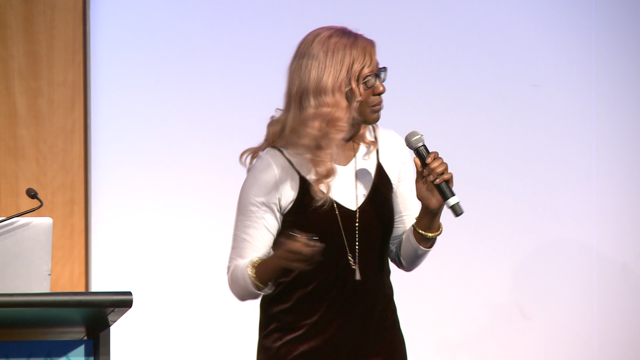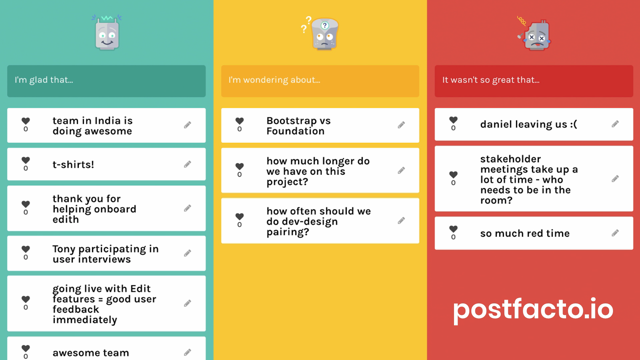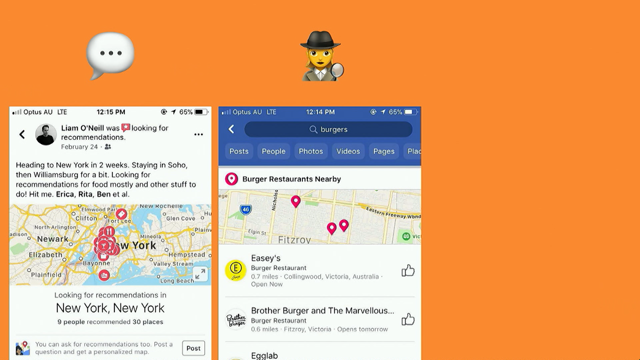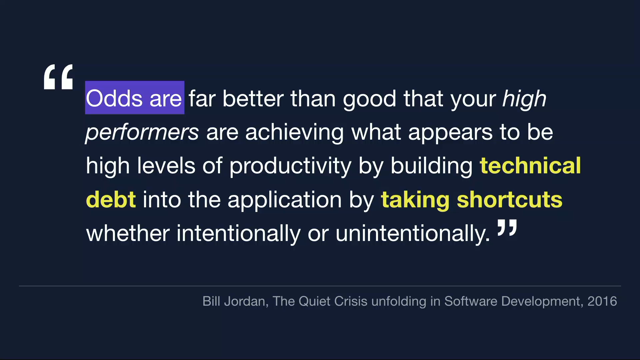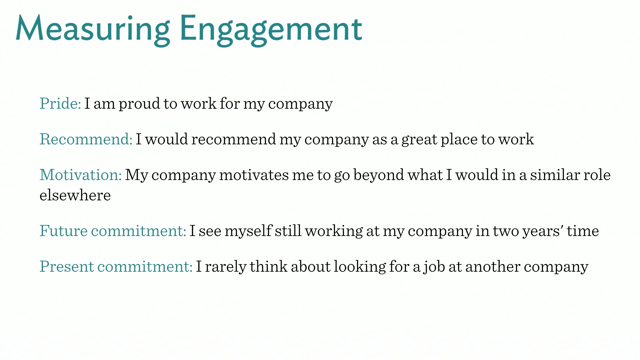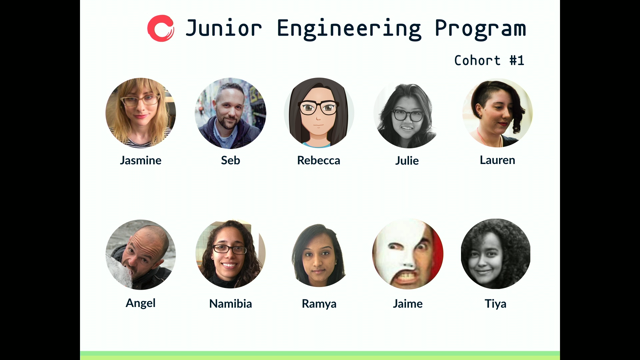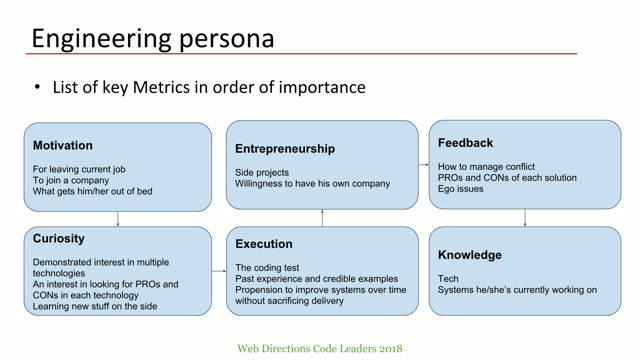Workstyles: the 4 basic styles & why leaders must be adaptive

(bright upbeat music) - So these colours looked a lot better on my computer. So hopefully they're not too painful for you all. It's really great to be here and to have an entire day where we get to be immersed in conversations, in thinking and in connection about culture. So that just feels like such a privilege.
And thank you to John for a speaker lineup that is gender balanced, and I don't mean just women, I mean having men up here in the stage as well. So thank you for that.
I wanna talk to you a little bit about work styles in a second, but first I will tell you a little bit about me, and why I'm connected to this topic, and why I wanna share it with all of you.
As you just heard, I'm from New York City, so the American following the American, I'm glad I got let in here.
I have been spending the last 15 years building two companies.
I love building high-growth organisations.
The company I'm at today, is the original coding bootcamp concept founded in 2012 in New York City.
I joined it with 10 people, today it's 700 people around the world.
And the company prior to that, I spent nine years at growing it from 60 to 1,500 people. So I love to build organisations.
And for those of you that are in this room, I imagine you know intimately what it feels like to build an organisation.
Sometimes it feels a little bit like you're pushing a boulder of a mountain. Anybody felt like that on a daily, on a weekly, on a monthly basis? The only way you can build an organisation is by acknowledging that you can't do it alone. It doesn't matter how good of a leader you are, if you're one person you can't push that boulder up the hill.
And I think that's really what we've heard about today when we've been talking about culture, is that ultimately, culture is successful if it's unlocking the potential of the people within your organisation.
No one here I imagine needs to be convinced that diversity matters, diversity of gender, of age, of race, of ethnicity, of sexual orientation. Those are all proxies for diversity of thought, diversity of perspective.
When we bring that diversity of perspective into our organisations, that's when we actually have all those positive impacts that Emma was talking about the great things that start to happen.
When you improve the diversity on your teams, you improve revenue, you improve innovation, you make better decisions within your organisation. And just by having people on your management team, and within your technical organisation that look diverse, you're more likely to be able to attract more diverse people.
They wanna work for you if you have a diverse team. So you have to start early.
And we know that we can achieve these results. But let's say, you already buy all of this, you wouldn't be here if you didn't.
You're actively working on this, you're trying to fix the problem that Emma so eloquently laid out for us, and maybe you've even built a diverse team. Now, you have to figure out how you can work with diverse people inside your organisation. And when you don't all think the same way, you have to figure out how you can be the conductor of your organisation and bring those people together. So that you're not having collisions all day long but you're actually creating collaboration within your organisation.
I'm sure you can imagine, you can picture, you can feel, you can go back to the moment in your company when somebody walked out of a meeting and they said, "I wasn't heard, I said something but nobody listened to me." Think about the difference between that collision of feelings which are really the fuel for your organisation as compared to somebody who walks out and says, "Well, my idea was heard but I understand why it can't be prioritised right now." That's collaboration.
That's someone who was able to express their opinion which was different from someone else.
It was heard and it was connected on.
Or someone who says, I don't understand why we're still focused on this anyway as compared to, I need to evaluate the impact of this. I didn't understand this point before but now I do, and I need to dig into it a little bit further. That's the actual value of diverse perspectives coming out within your organisation.
And of course what tends to happen, when all those women leave those tech organisations, because they come out of those meetings, they come out of the project, they come out of the retro and they go home and they're just exhausted. They're just tired.
They're tired of fighting, they're tired of feeling like they're pushing that boulder up the hill by themself and no one's listening as compared to the people, not just the women, but the people who come out of a really difficult challenging project and they say just how energised they are by it. We as leaders need to recognise that people in our organisation, when they're diverse, when we've done our jobs to get diverse perspectives inside our organisations, they're bringing their identity with them.
The identities that we have, you've heard about it by the speakers up here today, we come with different cultural backgrounds. I'm American, I might have some S's that are up here that are wrong.
We come with our cultural backgrounds, we come with our age differences, if we're parents, if we're not parents, all these things are a part of our identity. And it's that identity that affects the way that we show up to work every day, the way that we think, the way that we express ourselves, are we an introvert, are we an extrovert? The way that we approach problems.
And it's that very diversity that is actually the good stuff that we wanna get out in our organisations to make better decisions.
So I said I was gonna talk about work styles. Well, what the heck is a work style? This is the way that we deal with people around us every day.
And imagine if your style emerges in a way that's so different than everyone else's.
The way you think that brings that diversity of perspective into the organisation.
It's gonna help us achieve more revenue, it's gonna help us innovate faster, make better decisions, it's just shut down because it's so different.
That's the very asset that you've built in your company, and if you're turning it off, if you're shutting it out, you're losing the richness of the diversity in your organisation.
So why care? Hopefully, it's obvious to you.
But you need to think about work styles and understand who you are.
You need to be self-aware as a leader.
We all have natural tendencies of who we are because we have an identity that we're bringing with ourselves to work every day. What is it that we tend to do? What do we maybe tend to overuse a little bit? And as leaders we have the ability to drown other people out, so we have to be really thoughtful about that. And within your team in your organisation, you need to be aware of who have you hired, what is their identity, how does that affect the way that they show up to work every day? And how do you as an individual have the ability to adjust your management style to help someone on your team achieve their greatest potential and contribute to the success of your company? And this is about your culture.
Creating an environment where people with different backgrounds, different identities, different styles have the ability to contribute just as much is the thing that's actually going to make you successful in your organisation.
We think about diversity.
It's not enough to just say, I wanna bring diverse individuals into my organisation, I wanna create a place where people feel welcome, where people belong.
We need to do all of those things, but if we actually believe in all those research studies that have been done, that there's real value to the organisation, we actually have to cherish diversity. Think about that for a moment.
If you cherished diversity, might you pause for a second when someone is behaving so differently than you in a meeting, and might you value it a little bit more, might you pause and reflect and think about how your personality, if you have a big personality in the room? You might take a step back and you might let someone else lean in a little bit, maybe you will even invite someone to speak when they haven't been active yet. It's our jobs to be self aware of ourselves, of everyone around us to think about our organisation, and be the chief coach.
Somebody that's helping them identify who they are, where they need to develop, where they need to be something different than they might be today to achieve their greatest potential and how we can solve problems in our organisation where those collisions are taking place, and think about how we can create collaboration. Now work style might feel a little bit intangible, probably a little bit like culture, what is it? But there are frameworks that we can use to help us think through what are these patterns that people have learned that we have learned over the course of our lives for how we interact with other people, how we begin to approach problems and chase opportunities.
Again, we're getting back to all those great things that happen because of diversity in our organisations. And communication is one of the most important things to think about.
This is where a work style really begins to emerge. Think about how you typically communicate? Are you explicit? Do you put just a general challenge out there? How does the person that you're talking to like to receive communication? Do you get emails from some people in your organisation and you think, wow, I love it, every single time I get an email from this person. Is that about the substance of their ideas or is that about the way in which they're communicating with you? Okay, four common styles.
I'm gonna go through each of these in a little bit. As I do so, I want you to kind of think a little bit about which of these styles do you most deeply connect with? Now, anybody who's familiar with Myers-Briggs, or any of those personality type tests that say, you're an ENTJ for the rest of your life, and you're locked into that, that's not what this is about.
This is about a framework for the way that we show up, and that we tend to lean into it as our style, as the way we like to approach the world.
It doesn't mean we can't use all four of these, and in fact one of the things that I really wanna encourage you all to think about is as a leader, you want to be able to have situational leadership where you can lean into different work styles depending on the situation you're in.
But think about, in your mind, which of these do you most readily connect with? Okay, the Forecaster.
So this is the person, probably a founder who's always thinking about the future.
They love talking in concepts and ideas, they'll probably go off on a tangent, they wanna think 10 to 20 years out into the future. The Associator, this is the person who builds communities, a lot of these folks in the tech community, right. They're always thinking about the people in your organisation, how do they feel, how does this impact them, who's been left out? They're very insightful about your customers as well. The Systemizer, this is the person that helps you figure out how to scale.
Once you have that repeatable product, you need to figure out how you can do it over and over and over again with the same degree of quality; systems, processes, methodical, analytical. And the Energizer, this person has so much energy, they never stop, they're focused on results, they don't wanna know about the long-term plan, they wanna know what you can deliver and when. Okay, so let's do a round of hands, you only get one vote. Who in the room thinks that their lead work style is as a forecaster? A few, okay.
Associator? More.
Systemizer? A few more, and energizer? Wow, what a diverse group, this is really great. So we really saw the room split up.
And when you think about your organisation, that's exactly what you want, is you want people that are bringing these diverse perspectives to your projects and to your organisation.
Your style as a leader should be fluid.
I've actually done, there's a little quiz, I can share with you if you're interested in taking it, I've done this, I got exposed to this about 10 years ago in my career, and I take this quiz about every two years. My preferred styles have actually changed.
So you probably have one style that you tend to lean on for day-to-day behaviour.
You might have a reserved style, maybe you use both of those interchangeably or one is a style that you use when you might be in crisis mode, high-stress. You might have a least preferred style, something that you can use but you really don't like it, you're not very comfortable with it, maybe if you're an energizer, the idea of being the associator feels really uncomfortable. You might have an anti style, something you never ever use. Now imagine if you as a leader put two people on a project, and one has a preferred style and the other one is the anti style, collision, right, especially if they have no idea that the way they like to communicate and work with each other is so different from each other. But what an incredible opportunity, if you help them understand that and recognise it, and think about how they can change their work styles. Here's a few practical examples.
This is how this starts to emerge in our daily interactions. So if you're a forecaster, you might be starting to think as somebody approaches you, you've concerns about, well, what are the real ideas behind this, is this big enough? Is this going to make an effect on our company if we tried to invest in this? What's possible? These are the questions you might have.
Now imagine if you've pegged someone as a forecaster, you might wanna approach them with your idea in this fashion, but if you're a systemizer you're focused on facts, on organisation on accuracy.
You wanna know have you de-risked this idea? Have you considered the alternatives? This might be your CFO, it's might be your COO. Whereas the associator is immediately beginning to think about how will this affect our customers, how will this affect our staff? And the energizer just wants to know, when can I see those results? Now imagine if you're conducting an orchestra, and this is your company.
And you've brought all these perspectives together, might you make better decisions as an organisation if you have each of these perspectives represented on your projects, on your strategy, and on your day to day execution? And as you do that, as you bring these perspectives together, you start to get that richness that has come out in all of those research studies that show when we have different people in our organisations, we get better financial results, why? Well, because we all of a sudden start having people that are looking at the past and saying, we need to conduct a retro, we need to learn from what we did well and what we didn't do well. We need to think about how our customers and our people are thinking today but we also need to look to the future and make sure that we understand where our competitors are heading, how we're gonna stay ahead of them and what our own ideas are.
You all of a sudden get this rich fabric of information and all these diverse strengths that are brought out in your organisation.
But you also have to recognise as a leader, there are very dynamic, very strong personalities in your organisation.
You can probably name a few of them now.
It might be you.
Strengths can be overused, and we have to be careful as a leader of not being such a dominant voice in a meeting room, in strategy sessions and across the organisation that we drowned out these other perspectives. In fact, if you have such a strong style, you might think about deputising somebody who's very different than you.
And saying I want you to make sure you've brought your perspective into this meeting because I know we think differently, I know we approach problems differently, and we're going to get to a better outcome if we express all of these views together.
You can always adjust your approach, know who you're engaging with, know who's on the team, help people think about how their work style can be flexible, and can include other types of styles.
These are a few ideas, I'll share all this information out with everybody, you can take a look at this.
But you can imagine how you might change the way you're approaching a person or a project, if you know that they really lead with being an associator versus being an energizer.
So four challenges that I will leave you with to truly think about unleashing that diverse potential that you've brought into your organisations. Number one, know who you are.
As a leader in your organisation, you are incredibly important for setting the tone. Know what your strengths are and lean into those, but also know if there are parts of your identity in your personality that you don't express in the organisation and make sure that you are making room for that or you are cherishing that and elevating it. Know the work styles of the people on your direct team. Know what they need from you, how you might need to modify and adjust your management approach to help them be the best version of themselves. And think about a relationship where you might walk out of every conversation, every meeting and you're like, man, it's just so hard. I don't know why it's so hard, it's so much easier with everybody else.
Think about that relationship and think about what's in your own control to change. And deliberately write it down.
Think about it and then work on it over the next month. And then finally think about your larger organisation. Think about what you can do and what you have a responsibility to do to create the culture in your organisation that will cherish the diversity of the people that you've brought in and ensure that you can truly unleash their potential. One last note, so this was actually originally a workshop that I designed for my team, so this is a 60 to 90 minute workshop, I have all the materials including a survey, if you wanna test yourself and give it to your team for what you preferred, and if you have an anti style is and workshop materials, happy to share it out with anyone who might be interested.
Thank you.
(audience applauding) (bright upbeat music)
Ever wondered why working with some people feels a bit like rowing with the current when others can feel like rowing upstream? Had communication that crossed like two ships passing in the night? Kristi is passionate about culture, communication and helping people reach their fullest potential. Having spent the past 15 years leading NYC tech companies, she’s excited to share some frameworks to help you spot individual workstyles, develop adaptability and create a more productive work environment for everyone.
